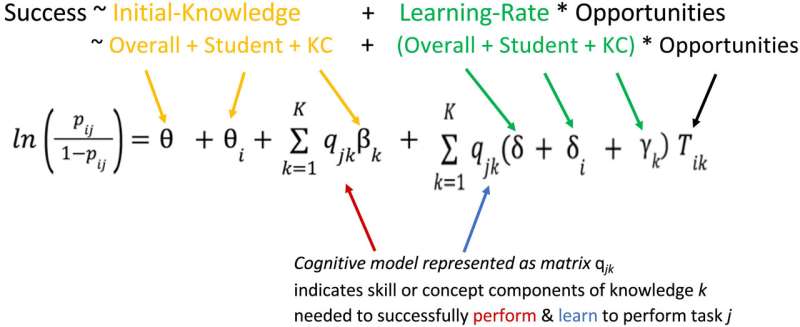This article has been reviewed according to Science X's editorial process and policies. Editors have highlighted the following attributes while ensuring the content's credibility:
fact-checked
peer-reviewed publication
trusted source
proofread
The myth of the fast learner

Learning science experts from Carnegie Mellon University's Human Computer Interaction Institute (HCII) wanted to know why some students learn faster than others. They hoped to identify fast learners, study them and develop techniques that could help students understand new concepts quickly. What they found was surprising: In the right conditions, people learn at a remarkably similar rate.
Ken Koedinger, the Hillman Professor of Computer Science, led the research published in the Proceedings of the National Academy of Sciences (PNAS). He and his team examined data from 1.3 million student interactions from different kinds of educational technologies, including intelligent tutors, online courses and educational games. The data, gleaned from learning science repository DataShop, indicated that learners master new concepts by having opportunities to practice them.
"The data showed that achievement gaps come from differences in learning opportunities and that better access to such opportunities can help close those gaps," Koedinger said. "This is further confirmation that these educational technologies can provide favorable learning conditions that make it easier to learn something new, like a second language, or a scientific or math concept."
If educators understand where their students are starting from, they can help students catch up to their peers by giving them more opportunities to practice the material. For example, they could incorporate a cognitive tutor that can give students instant feedback on homework problems. Koedinger emphasized the importance of tracking where learners are when they start a class.
"We have all seen cases where somebody gets to a learning outcome sooner than a peer—one student gets an A in algebra and another gets a C. But what we don't usually track is where they started. Our results are not contradicting that people end up in different places, but accounting for where students are starting from can tell us a lot about where they will end up," Koedinger said.
Paulo Carvalho, a systems scientist and special faculty at HCII and co-author, said the paper supports the idea that information sticks with students longer if they are actively engaged while learning, an experience supported by the kinds of educational technology used in this study.
"We have several studies that show that when a student is actively working they tend to do better than if they are just passively reading the materials," Carvalho said. "The data sets that we use for the PNAS paper all use systems that create favorable conditions for learning—the students are actively engaged, answering questions and getting immediate feedback, for example."
The data used in this study was from students from elementary to college courses in math, science and language. Koedinger said that for all students, a growth mindset is important.
"No matter who you are, you can do it. You might have had fewer prior opportunities in your life, so it may be harder at first than it is for other people, but you will make just as much progress as anyone else as long as you stick to it," he said.
More information: Kenneth R. Koedinger et al, An astonishing regularity in student learning rate, Proceedings of the National Academy of Sciences (2023). DOI: 10.1073/pnas.2221311120
Journal information: Proceedings of the National Academy of Sciences
Provided by Carnegie Mellon University





















